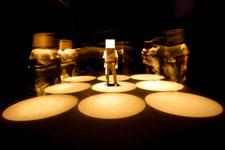Imagine waking up one morning with a cardboard box attached to your head. It never occurs to you to try to take it off so you go around complaining about it, and then you fall in love with another boxhead of the same sex and decide you want to have his baby but it is biologically impossible. Yikes! What a silly predicament to find yourself in. But at the core of your ridiculous, existential dilemma is a profound and fundamental question: What does it actually mean when someone tells you to go fuck yourself? This is one of the many silly questions that Darren O’Donnell’s vastly entertaining and brilliantly silly script Boxhead asks.
Originally produced in 1999 as part of Theatre Columbus’ Mayhem and the Naked Muse, remounted at Theatre Passe Muraille in 2000, and presented this past year at the Magnetic North Theatre Festival in Vancouver, the show was nominated for seven Dora Awards and recently published by Coach House Books. The current Buddies in Bad Times run, produced by Crow’s Theatre, is a fast-paced and hilarious remounting of a truly original piece of physical theatre. As the second offering in their current season, this show continues to reveal Buddies’ commitment to innovative and exciting work.
Adam Lazarus and Andrew Shaver, as the box-brained dynamic duo in search of love and metaphysical bliss, expertly execute the very demanding physical task of racing back and forth across the stage with semi-blinding boxes on their heads, all the time delivering a script intricately woven with a plethora of nonsensical human foibles. Everything from academic jargon to penis mockery and scatological humour becomes material for a script hell bent upon confusing, enlightening and titillating the audience. Chris Abraham’s clear and sharply focused direction, Steve Lucas’s evocative and powerful lighting, Naomi Campbell’s beautifully boxy proscenium-bound set and Roman Di Nillo’s score complement a brilliant cast that somehow renders the sight of two boy boxes kissing an endearing and sentimental spectacle to behold.
O’Donnell’s script, although dabbling in same-sex coupling, is more queer than gay as it embraces a world of puzzling possibility, both sexual and scientific, and indirectly raises the frivolous, fabulous and fundamental question: If a straight man fucks himself does that make him gay?’

 Why you can trust Xtra
Why you can trust Xtra


